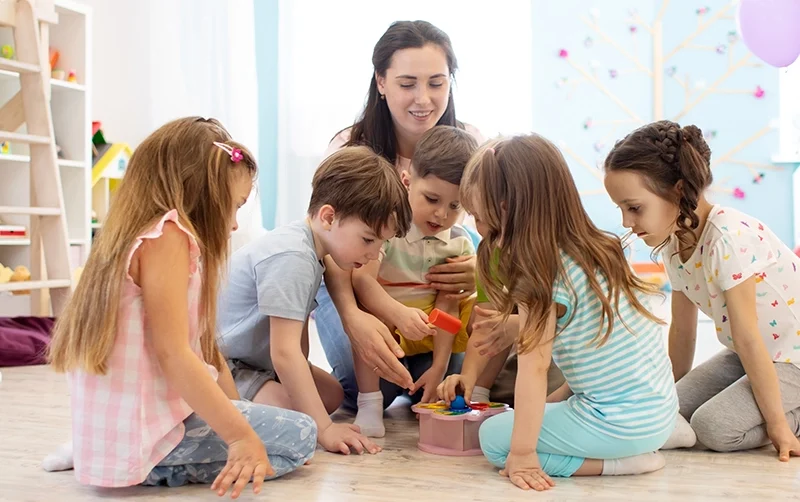Promoting Emotional Intelligence in the Classroom: Nurturing Tomorrow’s Leaders

Emotional intelligence (EI) is a critical skill that empowers individuals to understand and manage their emotions effectively. In today’s fast-paced and interconnected world, cultivating emotional intelligence is more important than ever. By promoting emotional intelligence in the classroom, schools can play a vital role in preparing students for success in both their personal and professional lives. In this blog post, we will explore the significance of emotional intelligence, delve into its various components, and discuss practical strategies for fostering emotional intelligence within the educational environment. Understanding Emotional Intelligence Emotional intelligence refers to the ability to recognize, understand, and manage emotions, both in oneself and in others. It encompasses various aspects, including self-awareness, self-regulation, empathy, and social skills. Students with well-developed emotional intelligence have a greater capacity to navigate relationships, make responsible decisions, and cope with stress and challenges effectively. The Components of Emotional Intelligence To fully grasp the concept of emotional intelligence, it is essential to explore its key components: Self-awareness: The ability to recognize and understand one’s own emotions, strengths, weaknesses, and values. Self-regulation: The skill to manage and control one’s emotions, impulses, and reactions in a positive and constructive manner. Empathy: The capacity to understand and share the feelings of others, demonstrating compassion and consideration. Social skills: The ability to build and maintain healthy relationships, communicate effectively, and work collaboratively with others. Motivation: The drive and enthusiasm to pursue goals, persist in the face of challenges, and inspire others. The Benefits of Emotional Intelligence Promoting emotional intelligence in the classroom offers numerous benefits for students: Improved academic performance: Emotional intelligence positively impacts academic success by fostering focus, resilience, and motivation among students. It enables them to handle academic pressures, setbacks, and challenges with composure and determination. Enhanced social skills: Emotional intelligence enhances students’ ability to build and maintain healthy relationships. They develop better communication, conflict resolution, and empathy, creating a harmonious classroom environment. Effective leadership skills: Emotional intelligence is a fundamental attribute of successful leaders. By nurturing emotional intelligence in students, schools contribute to the development of future leaders who can inspire and motivate others. Improved mental well-being: Emotional intelligence promotes self-awareness, emotional regulation, and stress management, reducing the risk of mental health issues such as anxiety and depression. Increased resilience: Students with strong emotional intelligence are better equipped to bounce back from setbacks and adapt to change, developing a resilient mindset that serves them throughout their lives. Strategies for Promoting Emotional Intelligence in the Classroom Implementing strategies to promote emotional intelligence in the classroom is a transformative endeavor. Here are practical approaches that educators can adopt: Emotion vocabulary and reflection: Teach students a wide range of emotion words and encourage them to reflect on their own emotions regularly. This practice helps develop emotional awareness and the ability to articulate and express emotions effectively. Emotional regulation techniques: Teach students strategies to manage their emotions constructively. Deep breathing exercises, mindfulness techniques, and journaling can help them regulate their emotions and develop self-control. Encourage empathy and perspective-taking: Foster empathy by promoting a culture of understanding and respect within the classroom. Engage students in activities that encourage them to consider others’ perspectives, building empathy and social awareness. Teach conflict resolution skills: Provide students with the tools to resolve conflicts peacefully and assertively. Teach active listening, problem-solving, and negotiation techniques to foster constructive communication and conflict resolution.
Nurturing Social-Emotional Skills in the Classroom: Strategies for Building Resilience and Empathy

In today’s fast-paced and interconnected world, social-emotional skills are vital for students’ overall well-being and future success. As educators, we have a unique opportunity to cultivate these skills in the classroom, fostering resilience and empathy in our students. In this blog post, we will explore the importance of social-emotional development, discuss the benefits of resilience and empathy, and provide practical strategies that educators can implement to nurture these skills in their classrooms. The Importance of Social-Emotional Skills: Academic achievement and lifelong success: Social-emotional skills are closely linked to academic performance. Students with well-developed social-emotional competencies demonstrate improved focus, self-regulation, and problem-solving abilities, leading to enhanced academic achievement. These skills also contribute to future success by promoting positive relationships, effective communication, and adaptability in the face of challenges. Emotional well-being: Social-emotional skills play a crucial role in promoting emotional well-being. Students who possess strong emotional intelligence can identify, understand, and manage their emotions effectively. This leads to greater self-confidence, reduced stress levels, and improved mental health. Positive relationships and empathy: Building healthy relationships is essential for personal and professional growth. Social-emotional skills, particularly empathy, enable students to understand and relate to others’ perspectives, fostering compassion, respect, and cooperation. These skills contribute to a positive and inclusive classroom environment. Fostering Resilience in Students: Encouraging a growth mindset: Teach students about the power of a growth mindset and the belief that their abilities can improve through effort and perseverance. Encourage them to embrace challenges, learn from mistakes, and view setbacks as opportunities for growth. Teaching problem-solving and decision-making skills: Help students develop effective problem-solving and decision-making strategies. Provide opportunities for them to identify and analyze problems, brainstorm solutions, evaluate options, and make informed decisions. Building self-confidence: Create a supportive environment that encourages students to take risks and step out of their comfort zones. Celebrate their achievements and highlight their strengths to boost their self-confidence and resilience. Promoting self-reflection and goal-setting: Encourage students to reflect on their emotions, actions, and experiences. Help them set realistic goals and develop action plans to achieve them. Regularly review progress and provide guidance and support along the way. Nurturing Empathy in Students: Modeling empathy: Be a role model of empathy by demonstrating understanding, active listening, and compassion in your interactions with students and others. Encourage empathy by sharing stories, discussing diverse perspectives, and promoting kindness and empathy towards others. Promoting perspective-taking: Engage students in activities that require them to see situations from different viewpoints. Encourage them to consider others’ feelings, experiences, and needs, fostering a deeper understanding of empathy and promoting tolerance and respect. Practicing active listening and effective communication: Teach and reinforce active listening skills, such as maintaining eye contact, asking clarifying questions, and summarizing what others have said. Encourage students to express their thoughts and feelings openly and respectfully, promoting effective communication and empathy. Cultivating a culture of inclusivity: Create a classroom environment that celebrates diversity and encourages students to appreciate and value individual differences. Foster inclusivity by promoting acceptance, respect, and empathy towards all students, regardless of their background or abilities. In conclusion, nurturing social-emotional skills, particularly resilience and empathy, in the classroom is crucial for students’ overall development and success. By implementing strategies that foster these skills, educators can create a supportive and inclusive learning environment where students feel empowered to navigate challenges, build positive relationships, and develop a strong sense of self. By promoting resilience, students develop the ability to persevere, bounce back from setbacks, and embrace growth. By nurturing empathy, students cultivate understanding, compassion, and the capacity to create harmonious connections with others. As educators, we have a responsibility to prioritize social-emotional learning and equip our students with the essential skills they need to thrive not only in their academic pursuits but also in their personal lives. By investing in the social-emotional development of our students, we are preparing them to become resilient, empathetic, and successful individuals in an ever-changing world.
























